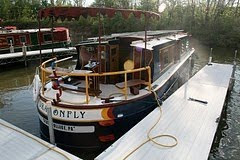 |
| Target acquired! Dive! Dive! |
Looking for more info about the pier, which has been a Titusville institution for decades, I came across an essay that fascinated me. It's the full text of a speech by local resident Laurilee Thompson (a former swordfish boat captain), delivered a few years back, at a conference on the ecology of Mosquito Lagoon, our next stop.
This essay is well worth a read. Laurilee talks about growing up on the waterfront in the 1960s, a kid with the freedom to go off and mess around in a boat, all by herself, for hours if not days at a time, on the Indian River lagoon.
 |
| Roseate spoonbills over Mosquito Lagoon |
Mostly, I was captivated by the detailed descriptions of the abundant wildlife here 40 years ago . . . and the changes she's see since then.
Thompson's essay reminded me of another essay I once read, back in the 1980s. It was the story of the coral reefs at Discovery Bay, Jamaica, which I'd visited in 1978, as a college biology major studying tropical ecology. Two years later, a hurricane wrecked the reef, and because the ecosystem had been so devastated, before that, by overfishing, it never recovered.
That writer pointed out, when tourists visit coral reefs, they're wowed by the colorful corals and fishes. In most cases, no one realizes that what you see now is a pale shadow of what once was. Changes in ecosystems can happen comparatively fast, and people live a comparatively short lifespan. As a society, we have no "ecological memory." Whatever you see at the moment, you accept as the new "normal."
 |
| Can Cap catch as much fish as a pelican? Stay tuned. |
I couldn't help but also think about the towns we've passed through, the empty downtown storefronts, the sprawl, the places where it's impossible to walk to services, the places where towns spent buckets of cash on new sidewalks but no one is walking on them--because WHY would you walk anywhere when you can drive your car? That's the "new normal," too.
This is is not a whine about returning to the good ol' (bad 'ol) days. I don't want to rewind the clock to 1500 AD and live with the mosquitoes like a Calusa Indian, or go back to the palmetto charm and social injustices of Florida in the early 20th century.
But sitting here, in the shadow of the place that once sent rockets to the moon, riding along in a boat powered by the sun, and sending messages instantaneously to people around the world, I keep returning to this thought: We have the ingenuity to do better.






Cynthia Kempinen writes:
ReplyDelete'ain't that the truth.' It makes me also reminiscent of how much our society has changed. Alan and I often talk about how lucky we were to be kids at a time when you just went out and played with the neighbor kids after school in pick-up games and only came in to eat if you had to--even if it was below zero outside !! Loved tetherball. Or you went to woods to explore for hours! And we knew everyone for miles!! We also find it so amazing to go out today and see couples where at least one of them is on the phone or texting for most of the date-does not our generation see that as being rude?! Not sure if you go by Ormond Beach but that is where I lived for a year [my dad worked on the Apollo project at the time]. My sister learned to drive there --on the beach - where they practiced driving skills !!
As always, enjoy reading about your adventures - and thanks for bringing back some great memories!